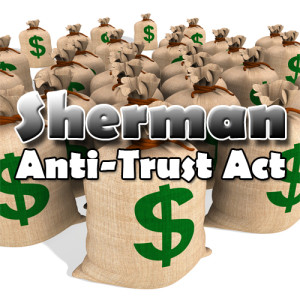United States v. E.C. Knight: Court Upholds Sherman Anti-Trust Act
Historical
In United States v. E.C. Knight, 156 U.S. 1 (1895), the U.S. Supreme Court held that the Sherman Anti-Trust Act was a valid exercise of Congress’ power under the Commerce Clause of the U.S. Constitution. However, it also held that the statute could not be used to prevent a monopoly in the manufacture of goods.
The Facts of United States v. E.C. Knight
Congress enacted the Sherman Anti-Trust Act in 1890 in an effort to address the rapid growth of corporate monopoly and the centralization of wealth. The statute provided that “every person who shall monopolize, or attempt to monopolize, or combine or conspire with any other person or persons, so monopolize any part of the trade or commerce among the several States … shall be deemed guilty of a felony.”
Shortly after the law was passed, the American Sugar Company sought to acquire its four largest competitors. Because the transaction would result in one company controlling 98 percent of the U.S. sugar-refining business, the federal government sought to enjoin the acquisition under the Sherman Anti-Trust Act.
The Majority Decision on United States v. E.C. Knight
By a vote of 8-1, the Court held that the Sherman Anti-Trust Act was constitutional, but did not apply to the facts of the case. Justice Melville W. Fuller wrote the majority opinion.
While the Court upheld the constitutionality of the Sherman Anti-Trust Act under the Commerce Clause, it found that it did not apply to manufacturing. According to the Court, the statute was intended to address “a monopoly in interstate and international trade or commerce, and not a monopoly in the manufacture of a necessary of life.”
In reaching its decision, the Court attempted to make a distinction between commercial activities within the purview of the federal government and those left to the states. It ultimately concluded that the Commerce Clause authorized Congress to pass laws governing the buying, selling, and transportation of goods between states. Meanwhile, oversight of how the goods were made was a state law issue. As Justice Fuller further explained:
That which belongs to commerce is within the jurisdiction of the United States, but that which does not belong to commerce is within the jurisdiction of the police power of the State. . . . Doubtless the power to control the manufacture of a given thing involves in a certain sense the control of its disposition, but . . . affects it only incidentally and indirectly.
While never expressly overruled, the Supreme Court gradually abandoned the reasoning in E.C. Night in favor of a more expansive interpretation of the Commerce Clause that allows for greater federal oversight over economic activities.
Previous Articles
SCOTUS Decision in Bowe v. United States Is First of the 2026 Term
by DONALD SCARINCI on February 5, 2026
In Bowe v. United States, 607 U.S. ___ (2026), the U.S. Supreme Court held that Title 28 U.S.C. § ...
SCOTUS Rules State Can’t Immunize Parties from Federal Civil Liability
by DONALD SCARINCI on January 29, 2026
In John Doe v. Dynamic Physical Therapy, LLC, 607 U.S. ____ (2025) the U.S. Supreme Court held that...
Supreme Court to Address Racial Discrimination in Jury Selection
by DONALD SCARINCI onWhile the U.S. Supreme Court has concluded oral arguments for the year, it continues to add cases t...
The Amendments
-
Amendment1
- Establishment ClauseFree Exercise Clause
- Freedom of Speech
- Freedoms of Press
- Freedom of Assembly, and Petitition
-
Amendment2
- The Right to Bear Arms
-
Amendment4
- Unreasonable Searches and Seizures
-
Amendment5
- Due Process
- Eminent Domain
- Rights of Criminal Defendants
Preamble to the Bill of Rights
Congress of the United States begun and held at the City of New-York, on Wednesday the fourth of March, one thousand seven hundred and eighty nine.
THE Conventions of a number of the States, having at the time of their adopting the Constitution, expressed a desire, in order to prevent misconstruction or abuse of its powers, that further declaratory and restrictive clauses should be added: And as extending the ground of public confidence in the Government, will best ensure the beneficent ends of its institution.





